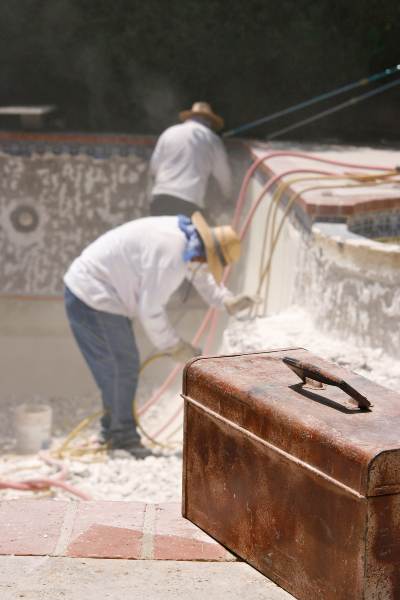Pool Replastering & Resurfacing Services in Jacksonville, FL
Expert Pool Resurfacing & Replastering
Signs Your Pool Needs Resurfacing
Cracks and Chips
If you notice cracks or chips in your pool's surface, it's a clear sign that the plaster is deteriorating. Resurfacing can repair these imperfections, preventing further damage and maintaining a smooth and safe swimming surface.Stains and Discoloration
Stubborn stains and discoloration can be unsightly and difficult to remove, indicating that the pool's surface has become porous and is susceptible to staining. Resurfacing can give your pool a fresh, uniform appearance, eliminating unsightly blemishes.Rough Texture
Over time, the pool's surface may become rough and abrasive, causing discomfort to swimmers. Resurfacing can restore a smooth and comfortable texture, enhancing the overall swimming experience.Fading and Dullness
If your pool's surface has lost its vibrant color and appears dull or faded, it may be time for resurfacing. Resurfacing will not only revive the aesthetic appeal of your pool but also protect it from further deterioration caused by UV exposure.Leaks and Water Loss
A significant decrease in water level, even with no visible signs of a leak, can indicate that the pool's surface has become porous and is allowing water to seep through. Resurfacing can help seal the pool, preventing leaks and water loss.Types of Resurfacing Material
● Plaster – Plaster is a traditional and cost-effective pool deck resurfacing material. It offers a smooth and classic appearance but is prone to chipping and staining over time. Regular maintenance and proper water chemistry are necessary to ensure its longevity.
● Pebble – Pebble pool finishes have gained popularity due to their natural and textured look. Made of small, smooth pebbles mixed with plaster, they provide a more durable surface compared to traditional plaster. Pebble finishes also offer a range of colors and textures, adding an aesthetic appeal to your pool.
● Concrete – Concrete resurfacing involves applying a layer of new concrete to the existing pool surface. It provides a strong and long-lasting finish, with options for customization through various textures, patterns, and colors.
Top Benefits of Pool Replastering & Resurfacing
● Restoring the Pool's Beauty – Over time, the pool surface can deteriorate, develop stains, or lose its luster. Replastering and resurfacing can rejuvenate the pool, giving it a fresh and attractive look that enhances your outdoor space.
● Improving Durability – Pool surfaces endure constant exposure to water, chemicals, and weather elements, leading to wear and tear. Replastering and resurfacing provide a new, durable layer that enhances the pool's resistance to cracking, chipping, and staining, extending its lifespan.
● Enhancing Comfort and Safety – Old, rough surfaces can cause discomfort and even lead to minor injuries. By replastering or resurfacing the pool, you can create a smoother and more comfortable surface, reducing the risk of abrasions and slips.
● Maintaining Water Quality – Damaged pool surfaces can harbor algae, bacteria, and other contaminants, affecting water quality. Replastering and resurfacing help create a clean and smooth surface, making maintaining proper water chemistry and hygiene easier.


